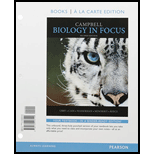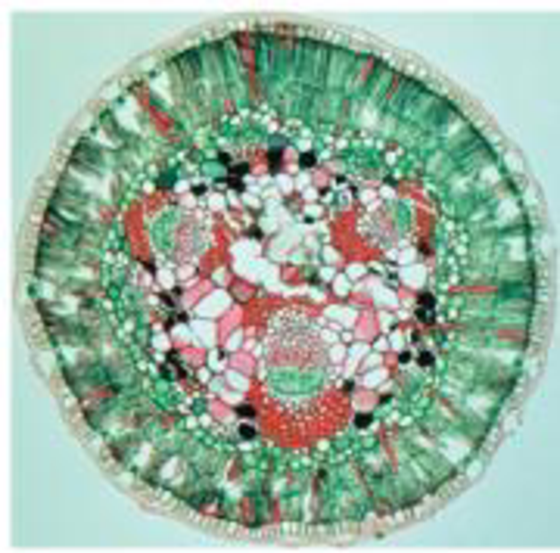
Campbell Biology in Focus, Books a la Carte Edition; Modified Mastering Biology with Pearson eText - ValuePack Access Card - for Campbell Biology in Focus (2nd Edition)
2nd Edition
ISBN: 9780134433769
Author: Lisa A. Urry, Michael L. Cain, Steven A. Wasserman
Publisher: PEARSON
expand_more
expand_more
format_list_bulleted
Textbook Question
Chapter 28, Problem 10TYU
SYNTHESIZE YOUR KNOWLEDGE

This stained light micrograph shows a cross section through a plant organ from Hakea purpurea, a shrub native to some arid regions of Australia (a) Review Figures 28.14, 28.17, and 28.18 to identify whether this is a root, leaf or stem Explain your reasoning (b) How might this organ be an adaptation to dry conditions?
Expert Solution & Answer
Want to see the full answer?
Check out a sample textbook solution
Students have asked these similar questions
2. a) As part of an experiment you are required to observe the external features of a fern.
State what microscope would you use and give reasons why?
b) You have been provided with a plant showing the rooting system and the stem with several leaves.
Give SIX features that you will look for to determine whether this is a monocotyledonous plant or a
dicotyledonous plant. Present your answer in a clear, logical manner.
c) In an experiment students were given the following materials and apparatus:
- juices from three local fruits; 4% glucose solution; Benedict's solution; test tubes,
beakers, syringes and boiling water bath.
Describe CLEARLY the procedure that can be used to estimate the amount of glucose
present in each juice. Use numbered steps in your answer.
Given below is an experimental setup to
demonstrate a particular tropic movement in
germinating seeds. Study the diagram and
answer the questions that follow
Perforated trough
Moist sawdust
- Germinating seed
-Brick
(i) Label the parts 1 and 2.
(ii) Name the tropic movement shown by part
1.
(iii) Part 1 is affected by two stimuli. Name
them. Which one of the two is stronger?
(iv) What is Thigmotropism ? Give one
example.
(v) What is meant by 'Positive' and 'Negative'
tropic movements in plants?
i) list TWO adaptations that show that the plant conserves water.ii) Photosynthetic cells produce starch and may be stored. Describe how one may test for the presence of starch on a piece of potato tissue. iii) Give TWO characteristics of monocotyledonous plants. d. The transition of plants from an aquatic environment to a terrestrial one has broughtabout many evolutionary adaptations for plants to survive on land. Give ONE adaptationfor each of the following divisions:i) Mosses: ii) Gymnosperms.
Chapter 28 Solutions
Campbell Biology in Focus, Books a la Carte Edition; Modified Mastering Biology with Pearson eText - ValuePack Access Card - for Campbell Biology in Focus (2nd Edition)
Ch. 28.1 - Prob. 1CCCh. 28.1 - WHAT IF? If humans were photoautotrophs, making...Ch. 28.1 - Prob. 3CCCh. 28.2 - Prob. 1CCCh. 28.2 - Prob. 2CCCh. 28.2 - Prob. 3CCCh. 28.3 - Prob. 1CCCh. 28.3 - Prob. 2CCCh. 28.3 - Prob. 3CCCh. 28.4 - A sign is hammered into a tree 2 m from the trees...
Ch. 28.4 - Would you expect a tropical tree to have distinct...Ch. 28.4 - Prob. 3CCCh. 28 - Most of the growth of a plant body is the result...Ch. 28 - Prob. 2TYUCh. 28 - Heartwood and sapwood consist of A. bark. B....Ch. 28 - Prob. 4TYUCh. 28 - Which of the following would not be seen in a...Ch. 28 - Prob. 6TYUCh. 28 - SCIENTIFIC INQUIRY Grasslands typically do not...Ch. 28 - Prob. 8TYUCh. 28 - FOCUS ON ORGANIZATION In a short essay (100-150...Ch. 28 - SYNTHESIZE YOUR KNOWLEDGE This stained light...
Additional Science Textbook Solutions
Find more solutions based on key concepts
The appearance of glucose in the urine a. occurs normally. b. indicates the presence of kidney disease. c. occu...
Human Physiology
Describe the role and impact of microbes on the earth.
Microbiology Fundamentals: A Clinical Approach - Standalone book
Physiology a. deals with the processes or functions of living things. b. is the scientific discipline that inve...
SEELEY'S ANATOMY+PHYSIOLOGY
Some people compare DNA to a blueprint stored in the office of a construction company. Explain how this analogy...
Biology: Concepts and Investigations
Relative thickness of the myocardium in different chambers; the functional significance of those differences; a...
Anatomy & Physiology: The Unity of Form and Function
Nursing Student with Neuropathic Pain
Tamara Costa broke her right tibia and has undergone two separate surger...
Human Anatomy & Physiology (11th Edition)
Knowledge Booster
Learn more about
Need a deep-dive on the concept behind this application? Look no further. Learn more about this topic, biology and related others by exploring similar questions and additional content below.Similar questions
- Many different treatments were possible in the phototropism experiment. Based on your understanding of phototropism, provide predictions about the direction of plant growth for the following two scenarios, and explain your reasoning. 1. The tip of the coleoptile is removed and lanolin with auxin is applied to the dark side of the stem. 2. The tip of the coleoptile is removed and lanolin with auxin is applied to the light side of the stem.arrow_forwardA) The concentration of CO2 is lower inside a plant cell than in the atmosphere (outside the cell). In your own words, describe how the CO2 levels are kept low inside the plant cell and explain why this is necessary. Assume stomata are open. B) Regarding the situation presented in Part A and assuming that the stomata of the plant leaves are closed, would this favour the induction of photorespiration in a C3 plant? Explain. Make reference to relevant molecule or molecules as needed. Please clearly label your responses as A and Barrow_forwardWatch the suggested videos for Plants Response to Stimuli. a. GeotropismGeotropism Experiment (2:48 minutes)https://www.youtube.com/watch?v=AEo5UsPeB5gb. PhototropismPhototropism Experiment (2:16 minutes)https://www.youtube.com/watch?v=WZ1NRP3OF5w a. For each experimental set up (geotropism and phototropism), identify the dependent and independent variables that have contributed to how plants responded to the stimuli.arrow_forward
- UntouhedLeaves Describe what happened to the Mimosa leaf when touched. The picture on top shows a screenshot of the reaction of the plant leaf to touch presenting rapid response or nastic movement. Choose the correct statement that describes your result.. a. The leaf would rapidly move to clump together. b. Leaves moves as if it is being moved by wind. c. The plant dies since its hyper sensitive to touch. d. Leaf would bend to look it has been wiltedarrow_forwardWhich of the following statements about gravity perception is FALSE? A. Statoliths are specialized amyloplasts B. Statoliths are found in statocytes C. Gravity is sensed from the root cap acropetally through the zone of division D. Columella cells sense gravity through statolith pressure on the endoplasmic reticulum E. Auxin is the main hormone involved in gravity responsearrow_forwardKindly provide 2 examples plants having "adaptations for twining" including (i) mechanical support (ii) transportation for root materials (iii) production of new plants Kindly sketch the diagramarrow_forward
- Determine the collective true-false status of the statements using the choices below. I. Xylem consists of cells called sieve elements and their associated companion cells.; II. Both sieve elements and the associated companion cells are alive in mature tissue.; III. Companion cells are a type of collenchyma.; IV. A companion cell provides each sieve element with metabolic support and transfers sugars into it. Only two (2) statements are true. None of the statements is true. All statements are true. Only one (1) statement is true. Only three (3) statements are true.arrow_forwardShow the sequence of secondary growth by drawing the row of cells from the boxed area below and labeling the vascular cambium cell (V), 5 xylem cells from oldest (X1) to youngest (X5), and 3 phloem cells (P1 to P3). Show what happens after growth continues by drawing and labeling a row with twice as many xylem and phloem cells. How does the vascular cambium’s location change? A pear has a hard texture but juicy. State two cells that give the characteristics? State the function of the transitional epithelium found in the mammalian urinogenital system. (i) Identify type of tissue lines the air sacs of the lungs. (ii) Explain how the tissue named in (i) adapted to its function.arrow_forwardBelow are pictures of leaves from a Garry Oak tree (Quercus garryana). These leaves are found on the same tree, however, the top cross section is of a leaf in the lower canopy, which is relatively shaded. The other of the upper canopy, which is exposed to more sun. ENCER 40x (x.s.) Describe two differences between sun and shade leaves at the macroscopic (leaf) and two differences at the microscopic (cross section) scale and provide explanations for the differences observed in color (specific chlorophyll a vs. b enrichment and accessory pigments) and shape (leaf thickness and width). Note: You do not need to sketch out the leaf/slides.arrow_forward
- The vascular system in piants is made up of two tissues: phloem and xylem. (a) Mark on the image above the positions of the xylem and phloem. (b) Differentiate between these vascular tissues. (c) Identify and describe a recent technology used to determine plant structure.arrow_forwardThe data that is attached below was collected during a lettuce seed ecotoxicity assay. Lettuce seed assays are used to compare the ecotoxicity of methanol, ethanol, and isopropanol by these alcohols' effects on germination rate and root elongination. Using the attached data, help answer which alcohol seems to be the most toxic to lettuce seeds. Why or why not would your results be expected? What does this information tell you about using ecotoxicity data to estimate human toxicity?arrow_forwardFigure 2 shows the cross-section of a eudicot root. i. Based on Figure 2, identify the structure that regulates the movement of water and minerals towards the xylem in the root. ii. Name structure of the cell membrane allows it to act as a selective barrier? iii. Predict what will happen to the transportation of water and minerals through the plasma membrane if the root was poisoned and no cellular respiration occurredarrow_forward
arrow_back_ios
SEE MORE QUESTIONS
arrow_forward_ios
Recommended textbooks for you
 Biology (MindTap Course List)BiologyISBN:9781337392938Author:Eldra Solomon, Charles Martin, Diana W. Martin, Linda R. BergPublisher:Cengage Learning
Biology (MindTap Course List)BiologyISBN:9781337392938Author:Eldra Solomon, Charles Martin, Diana W. Martin, Linda R. BergPublisher:Cengage Learning

Biology (MindTap Course List)
Biology
ISBN:9781337392938
Author:Eldra Solomon, Charles Martin, Diana W. Martin, Linda R. Berg
Publisher:Cengage Learning
Visual Perception – How It Works; Author: simpleshow foundation;https://www.youtube.com/watch?v=DU3IiqUWGcU;License: Standard youtube license